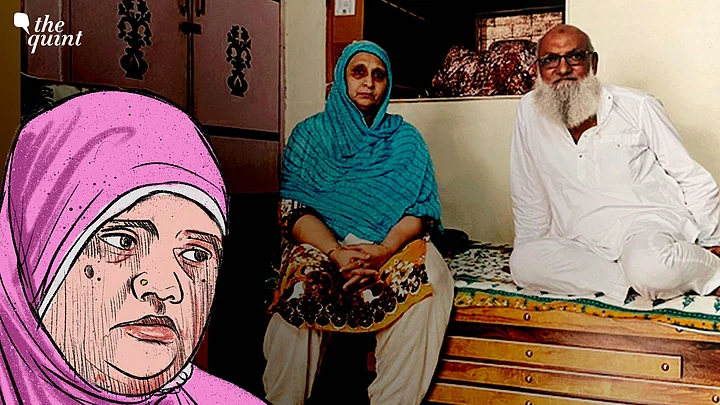“When I first saw Bilkis (Bano), she was sitting silently in a corner. Her clothes were torn, and she was staring blankly at the wall," recalled 61-year-old Latifa Giteli, who had sheltered Bilkis at her home in Gujarat’s Godhra in 2002.
After riots ravaged the state in 2002, Latifa and her husband, Mohammed Yusuf, a retired telecommunication engineer, turned their home into a temporary relief camp.
Bilkis stayed with them at their home in Godhra’s Mithekhan Mohalla for a few weeks.
Mithekhan Mohalla is 49 km away from Randhikpur – where 11 men gang-raped Bilkis, who was five months pregnant at the time, during the riots. Her three-year-old daughter was killed in front of her eyes, apart from 13 other relatives.
This is the first relief camp that Bilkis took shelter in after the gruesome violence.
“We haven’t spoken to her since the day she left but we have followed the news,” said Latifa. On 16 August, when the couple found out that the 11 men convicted of gang-raping Bilkis and killing 14 of her relatives, had been released from jail, they were shocked and heartbroken.
"I couldn't believe what I saw. My wife and I just stared at each other in disbelief," Yusuf told The Quint, seated inside his drawing room at his home in Mithekhan Mohalla.
When Latifa was told that Bilkis is not speaking to the media, she said, "Jab camp mein aayi thi, tab bhi kisi se baat nahi kar rahi thi. Aaj bhi nahi kar rahi. 20 saalon mein kya badla hai phir? (When she first arrived in the camp, she was silent. She is silent today. What has changed in 20 years?)"
'Still Get Nightmares From Our Days at the Relief Camp'
Latifa and Yusuf said that the news of the release of the convicts has brought back horrid memories of the riots – of injured men and women, wailing babies, and scars that run deep.
“It’s all we have spoken about since we found out that the convicts are out. In 2002, the situation was largely peaceful in our area. People from nearby villages, which had seen all the violence, sought asylum here. Residents of our area opened their homes, schools, mosques and turned them into relief camps. We did the same,” said Latifa.
Latifa and Yusuf’s two daughters were in college in 2002, and the family had converted their home into a 'delivery hall,' where they took care of distressed pregnant women and newborn babies and mothers.
"We didn't have any resources. We laid mats on the floor and got mothers to deliver babies there. In cases which were slightly more complicated, Dr Sajjad Vali, a gynaecologist who lived in our area, would visit and help the women," recalled Latifa.
The basement was turned into a safe space for pregnant women and new mothers. “We heard babies cry all day for weeks. Once things settled down, we shut the basement. Till date, we have not used it for anything else, not even as a storeroom," she added.
Twenty years later, the basement looks haunted – two dark chambers, thick spider webs hanging across a hall, and old, derelict furniture. "By god's grace, nothing happened to me, Latifa, or our children. But what we saw in the relief camp was beyond horrible. Those stories continue to haunt us till date," he said.
One of these many stories is that of Bilkis’.
“She was pregnant and not eating anything or talking to others. At first, we thought it must be the shock but then her aunt told me what had happened," recalled Latifa about Bilkis' early days in her house in 2002.
- 01/02
Twenty years later, the basement looks haunted – two dark chambers, thick spider webs hanging across a hall, and old, derelict furniture.
(Photo: Himanshi Dahiya/The Quint)

- 02/02
The basement has not been used by the family since the 2002 riots.
(Photo: Himanshi Dahiya/The Quint)

It was then that the couple informed a few lawyers, activists, and civil society members who were helping victims at the time. Bilkis was taken to a doctor, and a complaint was registered against people who assaulted her.
"The then Collector of Panchmahal district helped us file the complaint. She was a Hindu woman. I have forgotten her name now but she helped us a lot," said Yusuf.
Latifa now runs a school for children from the underprivileged sections of society and a sewing centre for women. “My husband and I had set up a charitable trust after the 2002 riots to rehabilitate victims of the riots, and that funds the school and the sewing centre," said Latifa.
Our Children Ask Us, 'Is This What Justice Looks Like?'
Latifa and Yusuf have four children – two sons and two daughters. "Our younger son was in class 10 when the riots broke out," they told The Quint.
In 2004, Yusuf was detained by the administration on charges of planning a bomb attack in Vadodara. He was acquitted after spending 11 months in jail. "Those 11 months were the toughest for our family. We believe we were targeted because we extensively helped in relief work during the riots," said Latifa.
“My daughters often asks me – is this what justice looks like? Is this what we get in return for helping others?" she added as tears rolled down her eyes.
For both Yusuf and Latifa, Bilkis’ story is a personal one. "In her victories and defeats, we see ourselves. A pregnant woman was raped, and her family members were killed in front of her. There were two children who came to the camp with her, probably her nephews or nieces. The children were unharmed but they must have watched what happened. Imagine the trauma they would have gone through," said Latifa.
“The release of these 11 men is a travesty of justice,” she added.


